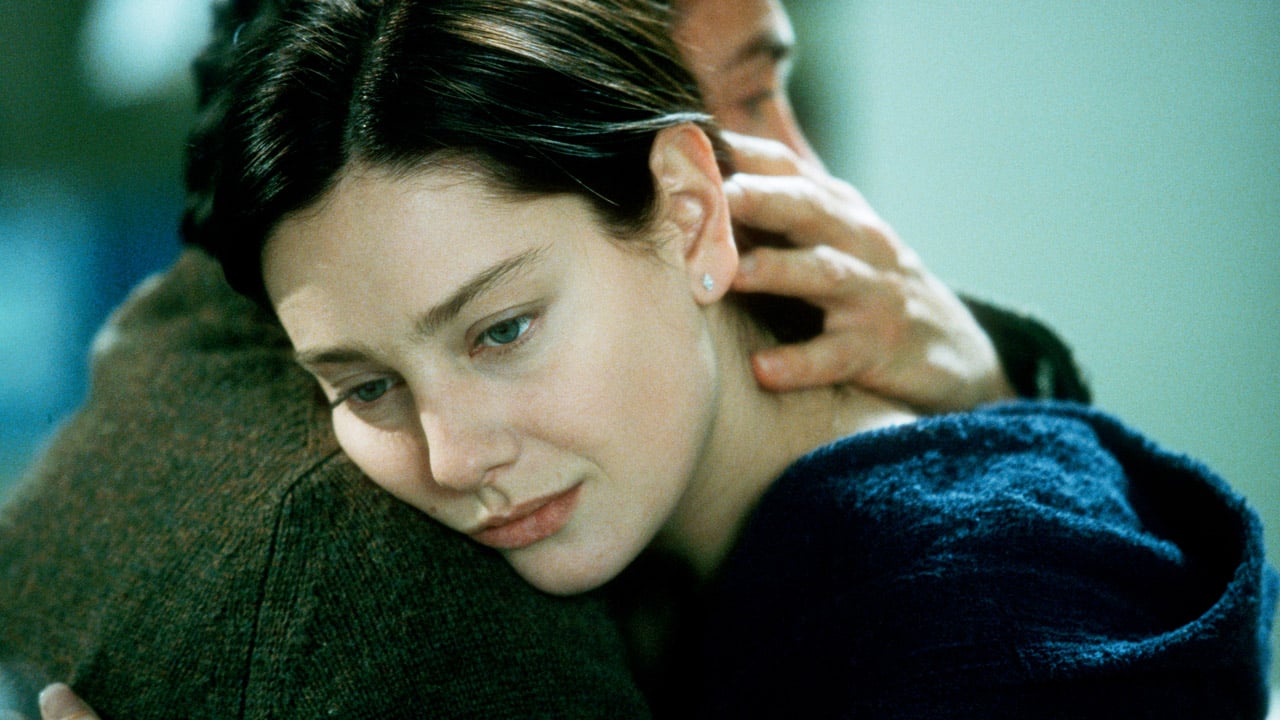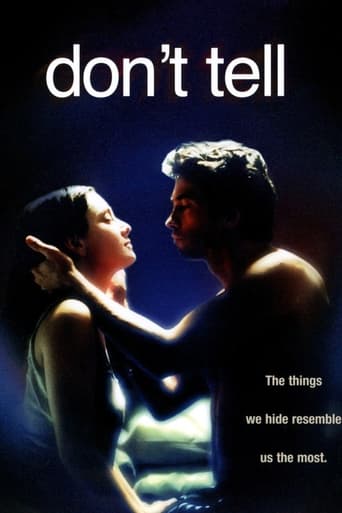

Sabina is a woman who seems to have it all: a job she loves, a nice boyfriend, and a great apartment. Yet, Sabina is carrying a heavy burden in her heart. It all comes to a head when she has to make a decision about the death of her parents, as we witness at the start of the film. All the bottled emotions are struggling to come out as she decides to spend Christmas with her brother Daniele in America. She wants to see her older sibling in order to make sense of her past and get closure with a horrible past.Sabina's boyfriend Franco, an actor, is selected to be in a soap opera. Being a theater actor, he is not completely satisfied with the idea, but being realistic, he has to compromise. Sabina, in parting, asks Franco not to see other women while she is away, knowing well the way things are in the world where Franco moves.Instead of being a joyous reunion, both siblings show a restraint in the way the visit develops. Daniele, who is a professor at an American university, plays the tour guide, pointing different aspects of the place he now calls home, but he never mentions anything about his own childhood. It takes a while for Daniele to open up to Sabina because she wants to get to the bottom of the secret that has damaged them both for life. Both, it turns out, are the victims of family sexual abuse by their father, an ugly situation perpetuated by the mother, who knowing about it, prefers to keep it hidden. When the truth comes out, we watch in horror scenes from both siblings childhood.Cristina Comencini, the author of the novel in which this film is based, adapted and directed with sure hand. She is the daughter of the distinguished Italian director Luigi Comencini. She has learned well as she sets her story with great precision, creating characters that one can relate to.The best thing in the film is the work of Giovanna Mezzogiorno. She brings life into Sabina, something that with another actress might not have been as easy. Ms. Mezzogiorno is simply splendid because she makes us care for this wounded woman who is searching for closure in understanding what was done to her at an early age. Equally excellent are Alessio Boni, who appears as Franco, the boyfriend, and Luigi LoCascio makes an impression as Daniele. Both these actors continue to surprise.
... View MoreBe it Sabina in w-d Cristina Comencini's "La Bestia Nel Cuore" 2005, or Giovanna in w-d Ferzan Ozpetek's "La Finestra Di Fronte" 2003, or Giulia in w-d Gabriele Muccino's "L'Ultimo Bacio" 2001, Italian actress Giovanna Mezzogiorno's portrayals are so complexly simple and 'relishingly' memorable to watch."Don't Tell" may not be for everyone due to the difficult, sensitive subject matter. There were Hollywood or television movies that dealt with this 'beastly' subject, and "Bliss" (1996 from writer-director Lance Young) came to mind. "Bliss" is more frank and direct in dealing with the sexual repression issue (the film is for mature audience.) Here with "Don't Tell" - based on her own novel "The Beast in the heart," co-writer and director Cristina Comencini gave us a more 'insider viewpoint' on this issue of family secrets. Through Sabina's anxieties, reactions to her nightmares, and through her brother Daniele's flashbacks and accounts of his childhood responses to his parents, we could feel the painful memories along with them.But the film is never heavy. Comencini has created for us sketches of life: we get to see Sabina in her everyday life, meeting the people she's with and cares for. Through them, we get the balance of humor in the conversations we eavesdrop vs. the somber subject of Sabina struggling internally with unwanted childhood memories. There is Emilia - a longtime childhood blind friend Sabina helps and visits regularly; Maria - a colleague at her marital crossroads Sabina hangs out and chats with; Franco - Sabina's actor boyfriend she loves and lives with; and through Franco at work on a TV soap series, we meet the lively director Andrea Negri, who somehow adds colorful tenderness to the young (love in, love out) couple of Sabina and Franco."A scar is an indelible mark, but it's not an illness," so Daniele, now married with a loving American wife and father of two sons, said to his sister Sabina. There are painful memories that we cannot erase, but we survive and learn to live anew, going beyond the past vs. wallowing in it. "Don't Tell" is a worthwhile film to experience. Thanks to Rosanna Del Bruno's translation (also on Gabriele Salvatore's "I'm Not Scared" 2003), the subtitles were easy to absorb as we appreciate the wonderful performances all round. For the fans of "The Best of Youth" (aka "La Meglio Gioventu") 2003, both the Carati brothers are featured in this film: Luigi Lo Cascio (Nicola) is Daniele the brother, and Alessio Boni (Matteo) is Franco the boyfriend.
... View MoreThis film was an amateur job at best. I would have expected more than a melo-dramatic soap opera to tell the story of such a sensitive subject. I've seen more talented first time directors and writers do a whole hell of a lot better then these seasoned soap workers. A pity certain scenes were interesting and somewhat well done had no leg to stand on, hence they seemed comical in their brief moments and then certain scenes in their flailing over stated tragedy were completely worthy of only a snicker and a wave of embarrassment for the filmmakers to write and direct such a cliché and stereotypical portrayal of...well...Everything AND Everyone! SHAME on the Oscar committee for nominating THIS film for Best Foreign Film...what kind of Judges does that committee have??? Ex Soap stars? We need to maintain SOME kind of level of excellence to recognize great ability to truly create work worthy of Oscar nominations next to the likes of our greatest filmmakers and entertainment talent of intelligence, skill and creativity, not amateur soap "workers". Please. Movie of the week maybe....but an Oscar Nomination? Because it was made in Italy. WAKE UP!! HELLO!!
... View MoreQuite interestingly, this movie is based on a novel written by director Cristina Comencini herself. It is the story of Sabina (Mezzogiorno), a woman that suddenly discovers that her late father had sexually abused her. As a consequence of this epiphany, she flees to join her brother, now a professor of classical literature at the University of Virginia. During that fortnight she realizes she was not the only one in the family that had gone through such a nightmarish experience. Meanwhile, back in Rome, her partner is unfaithful to her and her two best girlfriends (one of whom is blind and the other has just been left by her husband for a girl of 20), fall in love with one another.Yes, this is a bunch of material to work with and to squeeze all of it in a single 100' movie is a bit risky. Actually not all is credible. For example, the parallel story of Franco, Sabina's boyfriend, is not really interesting. Sabina foretells he will go to bed with the first girl he meets while she is away and quite obviously this proves right: a young girl forces her way into Franco's apartment on New Year's Eve and when he tells her to go, she stays because she knows there won't be taxis available (what the hell should the guy have done?). All in all the character of Franco is a bit dumb.The Sapphic love story between the blind girl and Sabina's colleague could have been weird, but is interesting instead, most of all thanks to the quality of the two actresses (Rocca and, especially, astounding Finocchiaro). Beautiful Giovanna Mezzogiorno, not surprisingly, does a good job.The main issue of the movie, incest, is focused in the right way, not too melodramatic, but rather balanced between Sabina's nightmares and her brother Daniele's quiet hate and rational will to carry on. Unfortunately, the ending is not really interesting. Plus, Lo Cascio is correct, but nothing more.I liked the flashbacks from what seems to be an apartment in the 70s: a dark, dusty place, with seemingly no windows at all, a perfect place for perpetrating sinister family crimes and bearing them silently (the character of the mother). The Charlottesville segment is convincing, if a bit long. It is not a digression, but rather the most important section of the story. During Sabina's US stay we almost forget about her connections with the characters she left in Rome, and for half of the movie the stories run parallel. Later they suddenly reunite, which results in something of a clash.In a sequence, Comencini pays homage to some great Italian directors of the past (I caught a glimpse of pictures of at least Fellini, De Sica and Pasolini). Ironically, the sequence is set in a TV studio where a laughable series about a hospital is being shot. TV fiction is explicitly criticized, although later in the movie this attitude changes a bit (Franco, who has worked on the stage and for the cinema, accepts the part of an anesthetist with stupid dialog and even says they occasionally shoot scenes with virtuoso camera movements!).Comencini is not a Fellini or a Visconti, nor are her Italian colleagues of her generation. But it is not their fault: cinema and the movie market have changed a lot since then. But as long as correct, high standard movies as La bestia nel cuore are produced in Italy, there is nothing to complain about. Go on like this.
... View More